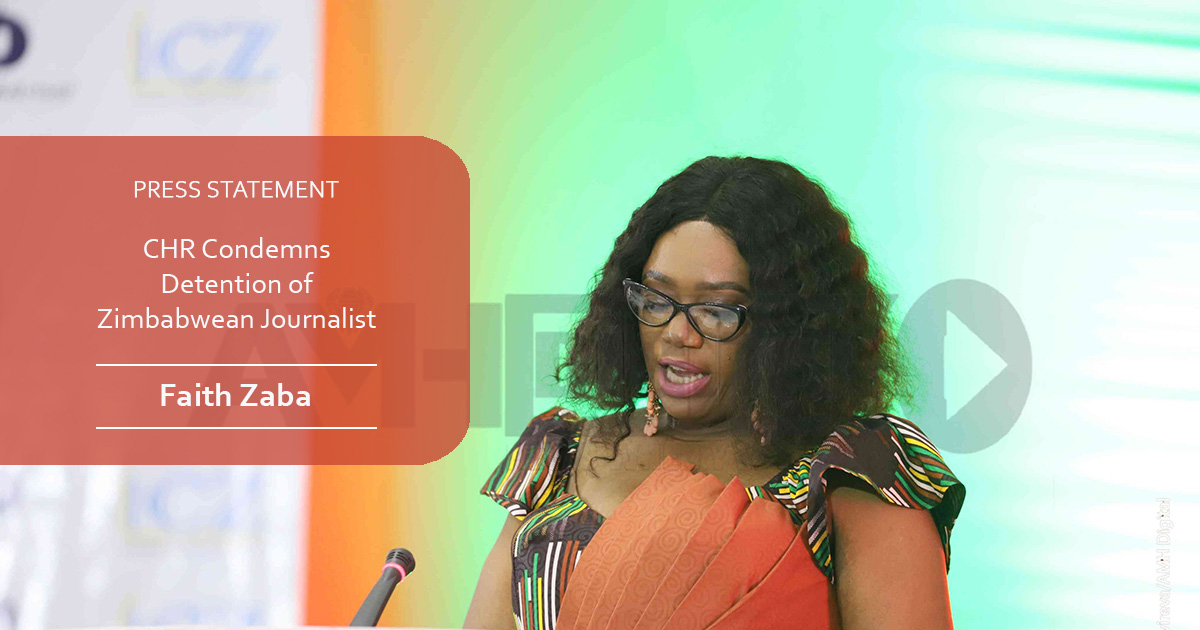2 July 2025
The Centre for Human Rights, Faculty of Law, University of Pretoria, strongly condemns the detention of Faith Zaba, editor of the Zimbabwe Independent, by Zimbabwean authorities over an article allegedly "undermining the authority" of President Emmerson Mnangagwa.
Ms Zaba was detained by Zimbabwean police on 1 July 2025, in connection with Muckracker, a satirical column published in the Zimbabwe Independent. The piece mocked Zimbabwe’s recent assumption of the Southern African Development Community (SADC) chairmanship, describing the regional bloc as a “trade union of dictators.” The Zimbabwe Independent is a weekly publication known for its independent journalism and critical reporting.
Zaba’s arrest follows closely on the recent detention of another journalist from the same media house, Alpha Media Holdings (AMH). Blessed Mhlanga, Head of News at HStv, was previously detained and spent 72 days in pretrial detention under similarly trumped up charges. These consecutive arrests suggest a disturbing pattern of repression targeting critical voices in Zimbabwe’s independent media.
The decision to detain a journalist over satire, a recognised and protected form of political expression, represents an alarming escalation in the Zimbabwean government’s attempts to suppress dissent, curtail freedom of expression, and silence independent journalism.
We are deeply concerned by the use of vague and overly broad legal provisions to silence critical voices. Allegations that a journalist has "undermined the authority" of a sitting president for publishing an article are incompatible with international and regional human rights standards, including the African Charter on Human and Peoples’ Rights and the Declaration of Principles on Freedom of Expression and Access to Information in Africa.
According to Principle 21 of the Declaration, defamation laws must not be used to penalise true statements, expressions of opinion, or reasonable commentary, particularly about public figures, who are expected to tolerate a greater degree of scrutiny. Principle 23(3) further clarifies that speech should not be prohibited merely because it offends, disturbs, or lacks civility.
The detention of Faith Zaba raises serious concerns about the shrinking civic space and declining press freedom in Zimbabwe, and about the safety of journalists across the region. In line with Principles 19 and 20, states are obligated to create an enabling environment for the practice of journalism and to protect journalists from arbitrary arrest, intimidation, and harassment.
Faith Zaba’s detention is not only a violation of these principles but sets a dangerous precedent for the region. Satire holds an important place in democratic societies as a mirror to power, especially when it provokes discomfort. To criminalise satire is to criminalise critical thinking. Its role is not merely to entertain, but to expose contradictions, hypocrisy, and abuses by those in positions of authority, be it political leaders, institutions, or dominant ideologies. Through irony, exaggeration, and wit, satire encourages the public to question accepted narratives and confront uncomfortable truths. In this way, satire helps cultivate a culture of accountability and reflection, which are essential pillars of a healthy democracy.
Criminalising satire creates a chilling effect on artistic and journalistic communities who play a crucial role in challenging power structures. When states respond to satire with legal punishment, they do not just silence the satirist, they also send a message that questioning authority is dangerous. In doing so, they weaken the democratic fabric that relies on open debate, informed critique, and the freedom to speak truth to power.
We therefore call for the immediate and unconditional release of Faith Zaba and an end to the misuse of vague, authoritarian laws to persecute journalists. The responsibility of the state is to protect the media, not punish it.
We stand in full solidarity with Faith Zaba and all Zimbabwean journalists who continue to serve the public’s right to know in increasingly repressive conditions. We urge the Government of Zimbabwe to honour its obligations under the African Charter and to demonstrate genuine commitment to democracy, transparency, and accountability.
Now more than ever, we must raise our collective voices to protect press freedom, promote transparency, and hold those in power accountable. Suppressing the media is not a show of strength, it is an admission of fear. Journalism is not a crime.
